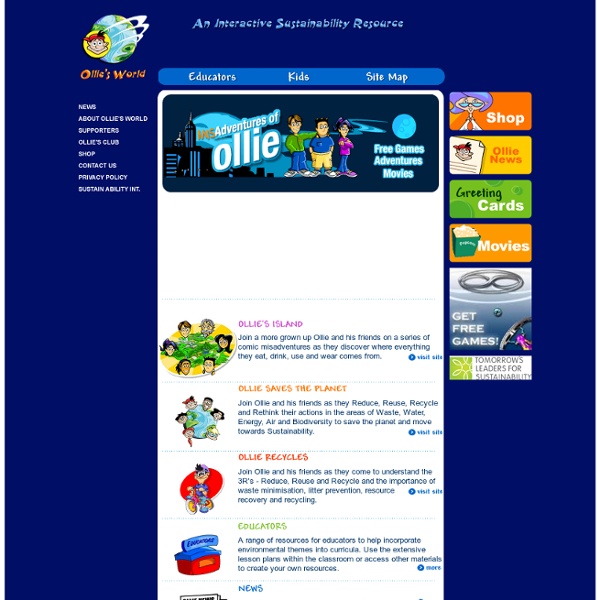



GreenHouse Games Sustainability Victoria State Government Victoria Page not found Page not found. We have recently updated our site and the page you're looking for may have been renamed or moved. You might find what you're looking for in the list below: Statewide Waste and Resource Recovery Infrastructure Plan (SWRRIP) Educators - Ollie's World - Interactive sustainability resource for kids The Ollie Programs contain many items for Educators. These include Units of Work, Professional Development information and suggestions - and overviews of the research and criteria that have been used to create the Program content. New Resources This section of the website contains newly released resources for teachers and community educators in the USA, UK and Australia.
What is our carbon footprint? - Your climate, your life How do we know the amount of CO2 that we are responsible for so that we can take steps to reduce it? Our individual carbon footprint measures the amount of carbon dioxide produced as we go about our everyday lives. It is measured in tonnes of carbon dioxide emitted into the atmosphere.
Twenty Kids Videos About Sustainability « Sustainability Hub We Can Change Families Can Save Energy CFL or LED Light Bulbs Save Energy Save Water For Frank The Fish Follow A Drop Of Water Kids First Garden Experience CERES: Community Environment Park CERES Education Programs Environmental education lies at the heart of CERES, which has grown from its humble beginnings into one of the largest sustainability education providers in Victoria. CERES Education provides a wide range of services to schools: * Excursions - for student groups of all ages amongst the inspiring setting of CERES. * Incursions - brings the magic of CERES to your school or organisation. * Training - adult workshops and short courses plus Vocational Education and Training (VET) programs.
CarbonKids Educational Resources CarbonKids is a program for schools committed to tackling climate change. The educational resources offer a range of ideas and activities for the early, primary and middle years of schooling and enable students to achieve outcomes set out in State and Territory curriculum frameworks. 10 August 2010 | Updated 29 October 2012 The units and complementary materials have been developed to assist students in developing an understanding of: climate change and its impact on society and environments the interrelationship between the greenhouse emissions, the environment and our society how to reduce greenhouse gas emissions in schools and local communities the role of forest biodiversity and biosequestration in addressing climate change how to adopt a sustainable lifestyle and take action to tackle climate change.
Learn about Photosynthesis Very few plants can actually trap their own food and none can go grocery shopping so plants need to make their food by themselves if they want to eat! Plants are fortunate as they are the only living organisms that can make their own food. How do they do this? Waste Excursions - The Sustainability Hub Waste programs focus on the ‘Rethink, Reduce, Reuse and Recycle’ philosophy and include environmental impacts of current practices and strategies to overcome them. Each dot represents one activity (which runs for approx 50 mins). You can mix and match activities from two different programs. Click on ‘Download Flyer’ to read more about each activity.
5 ways to teach your kids about sustainable living - Better World Books Blog - Book Reviews, Author Interviews, Community Outreach & more Guest post by blogger Rubela Jhonnie In order to leave behind a better world for our children, it is important for them to be well aware of protecting the environment. Children can make a difference if you teach them about sustainability and empower them to appreciate and preserve the environment. Here are 5 ways in which you can do that for your children. index Aimed at students from prep to year 10, our free* classroom presentations allow students to learn about a range of water related topics. They can be used to introduce water as a topic or to consolidate previous learning. The free school visits can be tailored to your needs, with presentations for different age groups and water topics.